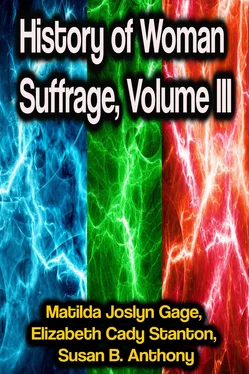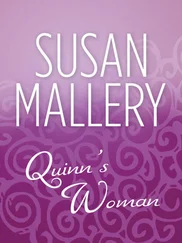Resolved , That the Judiciary Committee be instructed to report to the Senate a bill to submit to the qualified electors, at the next general election for senators and representatives, an amendment to the constitution, whereby the elective franchise shall be extended to the citizens of Ohio without distinction of sex .
During the same year a similar report was made in the legislature of Wisconsin. From the report on the subject we quote the following:
We believe that political equality, by leading the thoughts and purposes of men and women into the same channel, will more completely carry out the designs of nature. Woman will be possessed of a positive power, and hollow compliments will be exchanged for well-grounded respect when we see her nobly discharging her part in the great intellectual and moral struggles of the age that wait their solution by a direct appeal to the ballot-box. Woman's power is at present poetical and unsubstantial; let it be practical and real. There is no reality in any power that cannot be coined in votes.
The effect of these discussions and efforts has been the gradual advancement of public sentiment towards conceding the right of suffrage without distinction of sex. In the territories of Wyoming and Utah, full suffrage has already been given. In regard to the exercise of the right in the territory of Wyoming, the present governor of that territory, Hon. John W. Hoyt, in an address delivered in Philadelphia, April 3, 1882, in answer to a question as to the operation of the law, said:
First of all, the experience of Wyoming has shown that the only actual trial of woman suffrage hitherto made—a trial made in a new country where the conditions were not exceptionably favorable—has produced none but the most desirable results. And surely none will deny that in such a matter a single ounce of experience is worth a ton of conjecture. But since it may be claimed that the sole experiment of Wyoming does not afford a sufficient guaranty of general expediency, let us see whether reason will not furnish a like answer. The great majority of women in this country already possess sufficient intelligence to enable them to vote judiciously on nearly all questions of a local nature. I think this will be conceded. Secondly, with their superior quickness of perception, it is fair to assume that when stimulated by a demand for a knowledge of political principles—such a demand as a sense of the responsibility of the voter would create—they would not be slow in rising to at least the rather low level at present occupied by the average masculine voter. So that, viewing the subject from an intellectual stand-point merely, such fears as at first spring up, drop away, one by one, and disappear. But it must not be forgotten that a very large proportion of questions to be settled by the ballot, both those of principle and such as refer to candidates, have in them a moral element which is vital. And here we are safer with the ballot in the hands of woman; for her keener insight and truer moral sense will more certainly guide her aright—and not her alone, but also, by reflex action, all whose minds are open to the influence of her example. The weight of this answer can hardly be overestimated. In my judgment, this moral consideration far more than offsets all the objections that can be based on any assumed lack of an intellectual appreciation of the few questions almost wholly commercial and economical. Last of all, a majority of questions to be voted on touch the interests of woman as they do those of man. It is upon her finer sensibilities, her purer instincts, and her maternal nature that the results of immorality and vice in every form fall with more crushing weight.
A criticism has been made upon the exercise of this right by the women of Utah that the plural wives in that territory are under the control of their polygamous husbands. Be that as it may, it is an undoubted fact that there is probably no city of equal size on this continent where there is less disturbance of the peace, or where the citizen is more secure in his person or property, either by day or night, than in the city of Salt Lake. A qualified right of suffrage has also been given to women in Oregon, Colorado, Minnesota, Nebraska, Kansas, Vermont, New Hampshire, Massachusetts, Michigan, Kentucky, and New York. Of the operation of the law in the last-named State, Governor Cornell in a message to the legislature on May 12, said:
The recent law, 1882, making women eligible as school trustees, has produced admirable results, not only in securing the election of many of them as trustees of schools, but especially in elevating the qualifications of men proposed as candidates for school-boards, and also in stimulating greater interest in the management of schools generally. The effect of these new experiences is to widen the influence and usefulness of women.
So well satisfied are the representatives in the legislature of that State with these results that the assembly, by a large majority, recently passed to a third reading an act giving the full right of suffrage to women, the passage of which has been arrested in the Senate by an opinion of the attorney-general that a constitutional amendment is necessary to accomplish the object. In England women are allowed to vote at all municipal elections, and hold the office of guardian of the poor. In four States, Nebraska, Indiana, Oregon, and Iowa, propositions have passed their legislatures and are now pending, conferring the right of suffrage upon women.
Notwithstanding all these efforts, it is the opinion of the best informed men and women, who have devoted more than a third of a century to the consideration and discussion of the subject, that an amendment to the federal constitution, analogous to the fifteenth amendment of that instrument, is the most safe, direct, and expeditious mode of settling the question. It is the question of the enfranchisement of half the race now denied the right, and that, too, the most favored half in the estimation of those who deny the right. Petitions, from time to time, signed by many thousands, have been presented to congress, and there are now upon our files seventy-five petitions representing eighteen different States. Two years ago treble the number of petitions, representing over twenty-five States, were presented.
If congress should adopt the pending resolution, the question would go before the intelligent bodies who are chosen to represent the people in the legislatures of the various States, and would receive a more enlightened and careful consideration than if submitted to the masses of the male population, with all their prejudices, in the form of an amendment to the constitutions of the several States. Besides, such an amendment, if adopted, would secure that uniformity in the exercise of the right which could not be expected by action from the several States. We think the time has arrived for the submission of such an amendment to the legislatures of the States. We know the prejudices which the movement for suffrage to all without regard to sex, had to encounter from the very outset, prejudices which still exist in the minds of many. The period for employing the weapons of ridicule and enmity has not yet passed. Now, as in the beginning, we hear appeals to prejudice and the baser passions of men. The anathema, "woe betide the hand that plucks the wizard beard of hoary error," is yet employed to deter men from acting upon their convictions as to what ought to be done with reference to this great question. To those who are inclined to cast ridicule upon the movement, we quote the answer made while one of the early conventions was in session in the State of New York:
A collection of women arguing for political rights and for the privileges usually conceded only to the other sex is one of the easiest things in the world to make fun of. There is no end to the smart speeches and the witty remarks that may be made on the subject. But when we seriously attempt to show that a woman who pays taxes ought not to have a voice in the manner in which the taxes are expended, that a woman whose property and liberty and person are controlled by the laws should have no voice in framing those laws, it is not so easy. If women are fit to rule in a monarchy, it is difficult to say why they are not qualified to vote in a republic; nor can there be greater indelicacy in a woman going to the ballot-box than there is in a woman opening a legislature or issuing orders to an army.
Читать дальше












